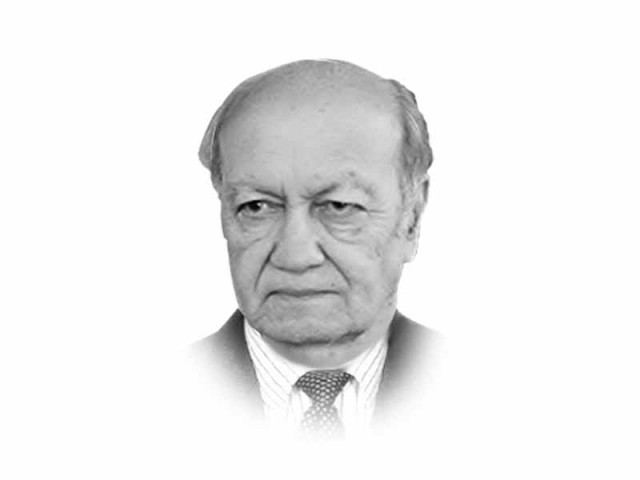Longing for a change
With the Election Day getting closer, electioneering is heating up and so are verbal assaults on opponents

The writer is a retired lieutenant general of the Pakistan Army and a former federal secretary. He has also served as chairman of the Pakistan Ordinance Factories Board
Fortunately, the drama that preceded the arrival of Nawaz Sharif and his daughter Maryam despite the overreaction and nervousness of the Punjab government and state institutions did pass without any serious mishap. Nawaz’s submitting to the rule of law was a good precedent and as some pundits were suggesting they could gain politically and their presence in Pakistan will be a constant sore point for opponents and a source of inspiration for party enthusiasts. How far this will come true only time will tell.
With the Election Day getting closer, electioneering is heating up and so are verbal assaults on opponents, with Imran Khan and Sheikh Rashid in the forefront. Khan is leading the banner of self-righteousness being untainted by any corruption scandal. He has the advantage of not having held any official position in the past, and his personal income and transactions also stand cleared. In future, for any PTI member involved in corruption, he can blame the individual and let the accountability law take its own course. Alternatively, based on his judgment, he can take action against corrupt individuals, thereby showing zero tolerance for corruption.
As a general principle, we do not need a culture of demonstrative piety. Honesty should be a normal phenomenon and not to be worn on the sleeve. But in Pakistan to advance political goals it has become a norm that reflects a deep sense of complex at the individual and societal level.
A more fundamental question is whether it is feasible to eliminate or minimise corruption with the entire election campaign centering on the electables. Is it possible to introduce and implement radical reforms and serve the interests of the broad masses if electables are in parliament and running the affairs of the state? How will Pakistan be any different if the route to winning elections is the so-called “electable”? How will the PTI chairman realise his vision of a new Pakistan with the electable? These are not hypothetical questions but ones that need to be seriously considered as these very people have been running the affairs of the government and formulating national policies. Many of the problems that confront the country – even if not entirely their doing — were very much prevalent and they failed to correct these while they were sharing power in various governments.
An electable is defined as one who has the ability to win an election in a Pakistani political environment by exercising patronage. The power of patronage he draws by virtue of his wealth and feudal or semi-feudal hold on his constituents.
As the electable spends substantial amount of money and resources during elections, he expects to get it back whilst in power and it is difficult to do so by fair means. So the very foundation of our politics that is being promoted is based not as much on performance as on expediency.
Nawaz Sharif, knowing that he is destined to be heading to spend a long time in prison, has become even more vocal in his criticism of the political role of army characterising it as “a state above the state”. This poses a serious question regarding the future of democracy in two ways. Are we going to move towards democratic consolidation through an evolutionary process or confrontation? As of now the evolutionary process is not working due to several complex factors that have a historical context — four martial laws and the army’s predominant role in policy formulation and relations with major countries that the military finds difficult to abandon. Higher allocation of national resources based on the disturbed regional and internal security situation gives military the edge and creates an institutional imbalance. It is also their question of confidence in the judgment of civilian leadership when it comes to making sensitive policy decisions. Although the military’s record has not been without some major strategic blemishes as the 1971 war and Kargil adventure demonstrate. Besides, during periods of military rule major national weaknesses were as manifest as at any other time in the life of this country.
Another worrying aspect when major state institutions remain perpetually locked in confrontation is that they are playing on the weakness of each other instead of working in unison and it is only the enemies that benefit.
No doubt, the institutional friction and efforts at controlling democracy are not new to Pakistan as Beena Sarwar, a distinguished journalist, aptly remarks in a reputed blog “This self-correction will happen in Pakistan too despite all attempts at controlled democracy. The democratic process has its own momentum and eventually those seeking greater rights and freedoms will prevail”. I agree with her with a pray that the process moves forward at a faster pace with less turmoil, bloodshed and anguish. Our people have already suffered a lot. To reduce their burden, the onus of transformation should primarily rest on politicians and state institutions with civil society and media in a supporting role. The forthcoming elections once again provide this opportunity.
Published in The Express Tribune, July 18th, 2018.
Like Opinion & Editorial on Facebook, follow @ETOpEd on Twitter to receive all updates on all our daily pieces.















COMMENTS
Comments are moderated and generally will be posted if they are on-topic and not abusive.
For more information, please see our Comments FAQ